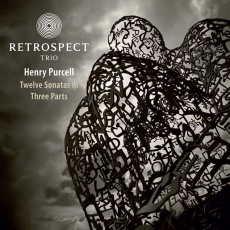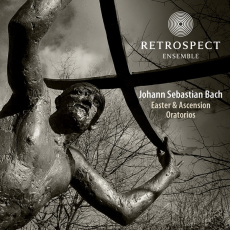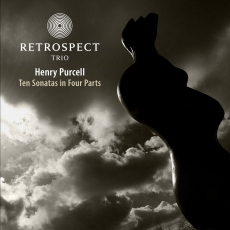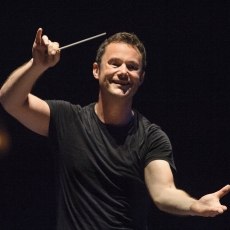Matthew Halls - Live Review - Oregon Festival - tommanoff.com
IF GERHARDT'S BACH banished Jung from my library (he'd been a discarded footnote to Claude Levi-Strauss for 30 years anyway - Levi-Strauss's structuralism brings all kinds of enlightenment to music), Conductor Matthew Halls' appearance had me digging for John Hollander's, The Untuning of the Sky: Ideas of Music in English Poetry, 1500-1700 . Hollander's masterpiece is among the greatest books ever written about music. It chronicles through poetry the passing of the ancient myth of the Harmony of the Spheres to a more modern, demythologized sensibility about music. The gradual transition occurred by the early Baroque period, though some of its deepest ideas remained, redefined as wistful aesthetics, not absolute truth to the emerging scientific age. Bach surely is the musical peak of that cosmological energy. Counting millennia one can look quite far back, beyond Europe into the myth's vast world history. Count notes, count stars, count the Trinity, count gods and goddesses alike, and you're counting the musical structure of the universe, according to the ancients.
To understand Hollander you must read and understand poetry. I'm going to guess that this applies in some way to Matthew Halls too. Poetry (or text, if you must) is no small issue for this conductor. His performance of Henry Purcell's Welcome to all the pleasures, showed immediately that he treats text and music as a complete unity. The rhythms, phrasings, motivic structure - the total substance in the music - can only be understood and made into sound through a complete and utter unity with the poetry. Performances of Purcell - and many other composers - suffer interpretations in which music and text seem disembodied. Modern audiences may read a text for meaning but have little experience listening to words and music as inseparable - except, notably, in popular music. One wishes they could listen to Purcell in some shady grove with some wine and a few dancing nymphs - and "get down" with the lyrics a bit.
Hall's Purcell showed that the conductor is an exceptional interpreter of the composer's music. I find very few recordings of Purcell untouched by a certain stuffiness of approach. Halls found the wispy but earthy magic in of the music: Lightness was matched with solid structure, poetry with the sound from instruments and voices alike. Halls' tasty recording of the Purcell's Ten Sonatas in Four Parts on Linn Records, is required listening when considering the conductor's OBF future.
Rarely has Baroque music other than Bach and Handel been heard at this festival. Rilling once offered some Monteverdi and Schütz. Perhaps there was more but not much. Indeed the festival has mostly treated Bach as a beginning for musical traditions, leading ahead in time to other composers. Halls' Purcell pointed to possible OBF programming of a much wider gaze into all the Baroque, not only presented, but performed with expertise.
Because Halls had been heralded as an early music specialist, I was unprepared, as were others, for the richly textured vocal sound from the OBF chorus in Britten's a cappella setting of a W. H. Auden poem, Hymn to St. Cecilia.
With this performance, Halls showed himself in Paul Hillier territory. OBF has long lacked a choral conductor at this level, a conductor with a masterful choral technique and profound understanding of a cappella vocal sound. Halls conducting technique stems from choral performance. It would be interesting to see that technique with a full orchestra in music from the core classical 19th century tradition.
The evening closed with a big-time performance of Handel's Ode on St. Cecilia's Day HWV 76.
A question for anyone following Rilling is can he or she make a big Baroque splash in the Hult Center's cavernous Silva Hall. Halls can. Although it was an "early-music-meets- mostly- modern- instruments - in- a -way- too-big-space" sort of thing, it was perfect for this hall and this festival. The players followed various aspects of Baroque practice: No vibrato from the strings (well, mostly) and lively Baroque phrasing which was dramatic and fetching. Perhaps most important, all the performers were joyfully connected with the conductor. Keen, energized music-making all around.
The critical pencils were out for Halls' stint as lecturer on Bach in the festival's Discovery Series on July 5th. Rilling's role as the fatherly Bach specialist, presiding over the composer's legacy with a firm, warm and sometimes wry spirit, has been central to the festival's soul.
During this festival I saw Jeffrey Kahane, Helmuth Rilling and Matthew Halls lead Discovery concerts. I found Halls quite brilliant, a worthy bearer of Rilling's legacy, but even more important, a reliable and steady beacon for Bach's music.
Halls may strike some Eugeneans as a rather lofty fellow with an English accent, but, if so, they're missing his essential qualities. Not only does he understand Bach, he doesn't hide his true humbleness before Bach's incomprehensible genius. He said so at the lecture with heart on sleeve. I believed him.
Rilling can serve up Bach with elegance and meat and potatoes. It is perhaps this wonderful combination of high mindedness and earthiness that makes him such a powerful and lovable figure in Eugene. Halls' personality isn't exactly earthy, though he finds all kinds of deep soil in music. He's elegant, certainly, but also deeply lyrical and poetic, important qualities for performing the most earthy of music.
Halls has two fine recordings of Bach on Linn Records: The Goldberg Variations and the Easter and Ascension Oratorios. More required listening.
I have written before that a failure of this festival has been the absence of music from the epoch before Bach. Where are Pérotin, Dunstable and Josquin ? Where are Machaut and Tallis ? Where is the great musical arc that led to Bach, he the mightiest of all figures in Western Music's thousand- year run, positioned at the midpoint and even outside history, striding past and present ? And where is the rich cultural/historical lineage that included the Harmony of the Spheres, the sacred counting of the cosmos in which the heavens were a model polyphony, harmony and counterpoint, the essential became the spectacular tools for the West's music, sacred and profane ?
I suspect that Matthew Halls might bring more of that history to the Oregon Bach Festival, finally connecting Bach to the full mainstream of time.



